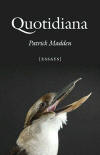Quotidiana
The gift that Patrick Madden gives us in Quotidiana is the gift great essayists have given us for centuries and that is the elegance of a mind at work. The essays Madden offers in this new collection are essays in the most traditional, classical sense. They do not traffic in the far-fetched or the bizarre, competing with reality television to hold our attention with a cacophony of sound, nor do they rely on the story to bear the weight of their subject, rather they investigate the way ordinary experience confounds and delights us, once we stop and pay attention.
The gift that Patrick Madden gives us in Quotidiana is the gift great essayists have given us for centuries and that is the elegance of a mind at work. The essays Madden offers in this new collection are essays in the most traditional, classical sense. They do not traffic in the far-fetched or the bizarre, competing with reality television to hold our attention with a cacophony of sound, nor do they rely on the story to bear the weight of their subject, rather they investigate the way ordinary experience confounds and delights us, once we stop and pay attention.
Early on in the collection, Madden considers the essay itself, a subject that interests him throughout the book. Madden sees the possibilities for essays everywhere, either in the moment unfolding before him or in the centuries of history that have preceded him. Essayists, he writes, “are keen observers of the overlooked, the ignored, the seemingly unimportant. They can make the mundane resplendent.” And Madden takes for his material everything from the number of apples in his local grocery store to the grandmothers of the disappeared who gather at the Plaza de Mayo in Buenos Aires to mathematical theorems rendered on the page as art. He does not braid these strands together; rather he replicates the connections his mind creates and leads the reader from garlic to Rush to the limits of the universe, seamlessly. His mind engages us immediately, his humor, his erudition, and as a reader we are more than willing to follow the twists and turns to arrive in a place we could not have gotten to on our own, while simultaneously feeling the journey was both intimate and familiar.
His final essay, entitled “Finity,” provides a stellar example of what Madden calls “the commonplace essay.” Like their cousins, commonplace books, a commonplace essay “will gather memories and research [. . .], attach ideas and stories to build upward, toward meaning.” A commonplace essay foregrounds the collaborative act of writing, the fact that writers have been influenced by those who came before and such influence should be celebrated. In “Finity,” we meet Montaigne, Archimedes, Madden’s high school physics teacher, Abraham, comedian Stephen Wright, Brigham Young, and molecular theorist Avagadro, to name just a few of those who have informed Madden’s thinking on the subject of finitude. And Madden moves us from grapes to the Bible to molecular science in the space of twenty pages, pressing these observations into conversation with one another, all the time building “upward, toward meaning.”
The possibilities of connection, he tells us, are infinite, while the things in this world to connect are limited. There will be new essays to write as long as there are people to write them. And because he connects these seemingly disparate ideas through the unique filter of his mind, his life experience, we arrive at a place we could have reached no other way. Not with an answer, but with understanding. You will never hold another bag of grapes in your hand, there in the grocery store, breathing Caesar’s last breath, without naming your place in relation to things and valuing that connection.
Madden’s Quotidiana is fresh and invigorating. The essay has strayed so far from its roots that we often forget its energy comes from a vigorous mind engaged in the pursuit of a subject, with the goal not of finding an answer but of increasing our understanding. Madden’s collection does just this, looping in and around itself, pulling evidence from literature, history, science, religion, and lived experience. Because he delights in “the infinite suggestiveness of common things,” so do we. And the reward is a rich and powerful reading experience that returns us, after ranging far and wide, to ourselves.





